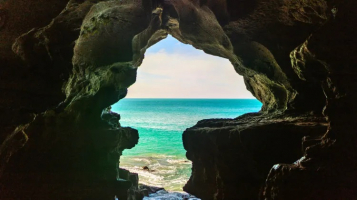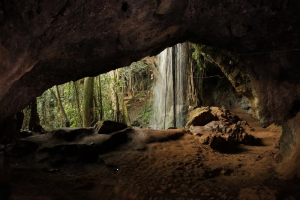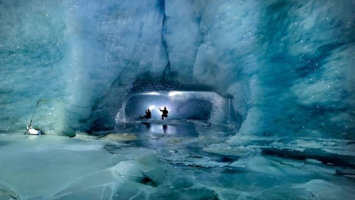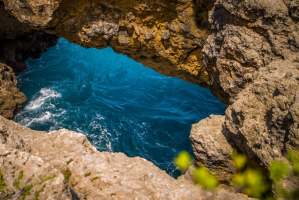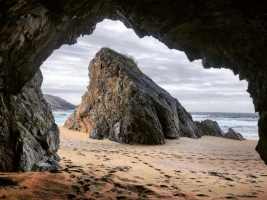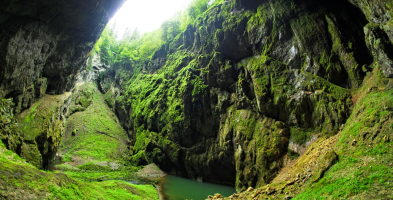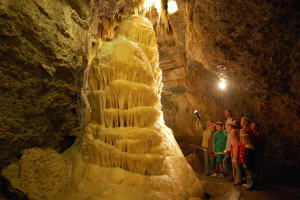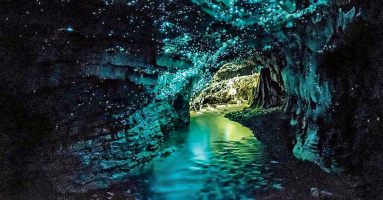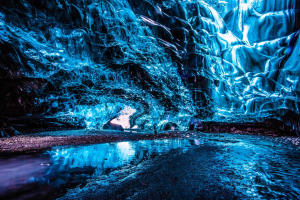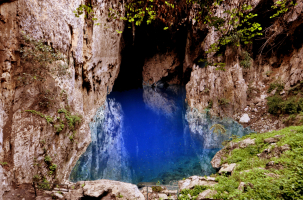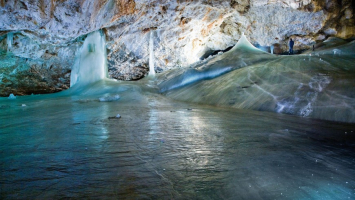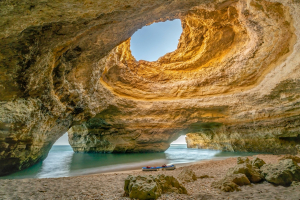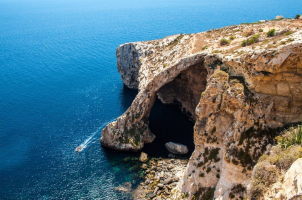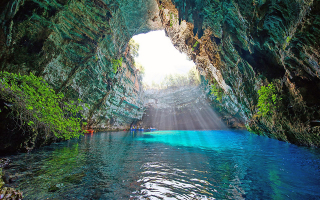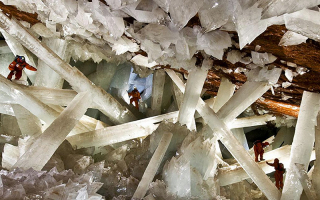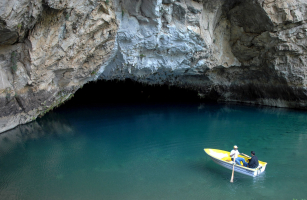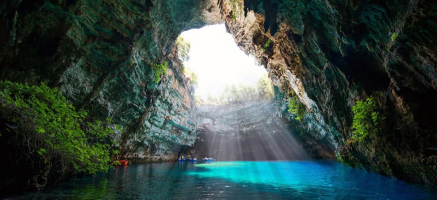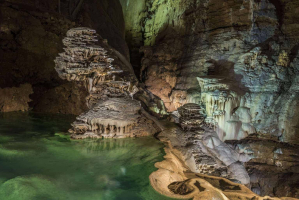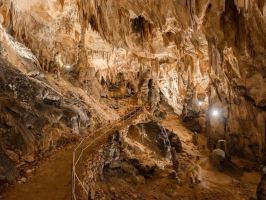Top 6 Most Beautiful Caves in Ukraine
Ukraine is known for its gorgeous and diversified terrain, well-preserved culture and heritage, attractive ladies, and a disastrous nuclear tragedy. Except for ... read more...Russia, this is Europe's largest country. If you're seeking for the greatest locations to visit in Ukraine this summer, without further ado, here are the most beautiful caves to visit in Ukraine.
-
Crystal Cave are regarded as one of Ukraine's and Europe's most unique and ancient. The deep lakes produced over 20 million years ago are connected to the Origins Crystal researchers. The cave was first mentioned seriously in 1721. The historical documents of a Polish priest encouraged cave explorers of the twentieth century to conduct in-depth research of these caves.
Crystal Cave located in the town of Krivche dozens, blends natural halls with stunning gypsum rock walls. These walls are adorned with charming sculptures, reliefs, and odd figures in a bright crystalline shade. Each room has its own name and a fascinating story to tell about the decor, which was inspired by nature.
Crystal Cave is a fantastic coach as well as a healing center. The medicinal characteristics of gypsum halls explained the high level of air ionization and ozone saturation, which aids in the treatment of bronchial disorders and asthma. The temperature is not above 10 degrees, while the humidity is between 90 and 100 percent. The underground rooms' greatest attraction, though, is their extraordinary natural beauty. The brilliant walls, old statues, and polished surfaces will pique the interest of even the most sophisticated visitor. The children's tour is especially memorable: dozens of legends, portrayed with crystal figurines, will be remembered for years to come. It was the first of its kind in Ukraine, with facilities for general attendance. Regional, republican, and state competitions and rallies of speleo tourists, as well as numerous scientific-research and tourist-sports expeditions, have all been filmed here; regional, republican, and state competitions and rallies of speleo tourists, as well as numerous scientific-research and tourist-sports expeditions, have all been held on a regular basis.
Location: Kryvche village, Borshchiv district in Ternopil region of Ukraine
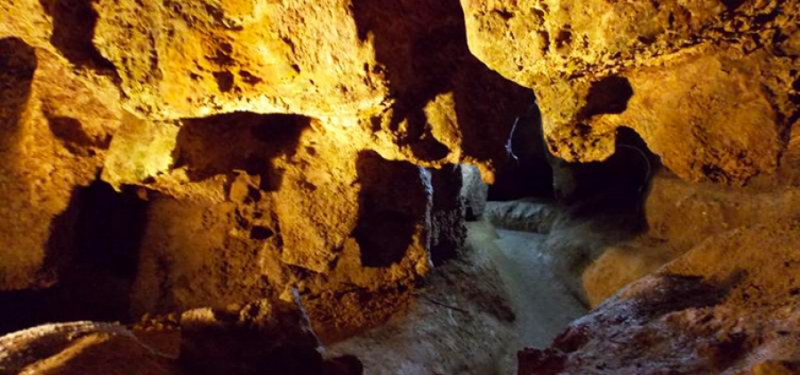
Photo: Navigator Ukraine 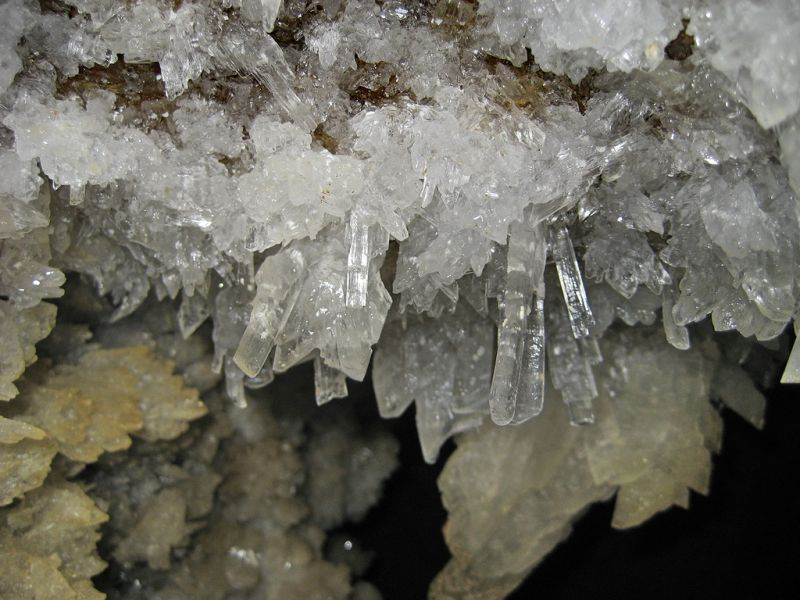
Photo: IGotoWorld.com -
When Anthony of Kyiv arrived in Boldina Gora in the second part of the nineteenth century, the history of the Saint Anthony caves in Chernihiv, Ukraine began. He excavated a cave for seclusion and prayers because the place had a special power. The cave deserves to be one of the most beautiful caves in Ukraine to visit.
The cave where St Anthony is said to have spent the last 40 years of his life is located about 300 meters above St Anthony's Monastery on a cliff just beyond the monastery walls. There is a little chapel with an altar and a tiny recessed room where the saint lived inside the cave, which is exclusively for the fit and non-claustrophobic (you must squeeze through a narrow entrance to get inside). Bring a torch (flashlight) to illuminate the inside.
The entrance is marked by a little church, after which you descend into a maze of tunnels that get smaller, colder, and darker as you progress deeper into the hill. A series of modest chapels led to medieval monks' cells and burial chambers, including one little rotunda with room above for a small choir.
Visitors to the Saint Anthony Caves are said to have observed a mysterious force. Some visitors get energised, cheerful, and light-hearted, and their depression lifts.
Length: 350 meters
Depth: 350 meters
Location: Chernihiv, Ukraine
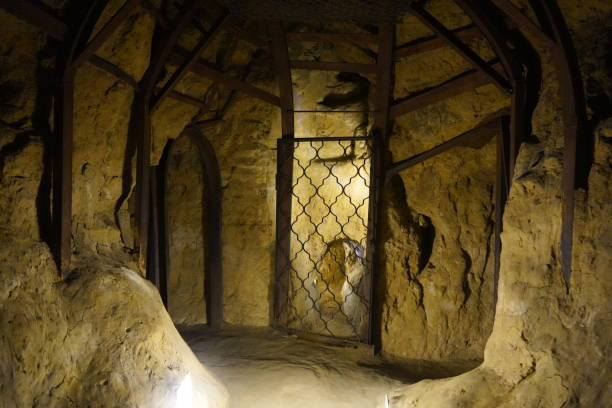
Photo: iStock 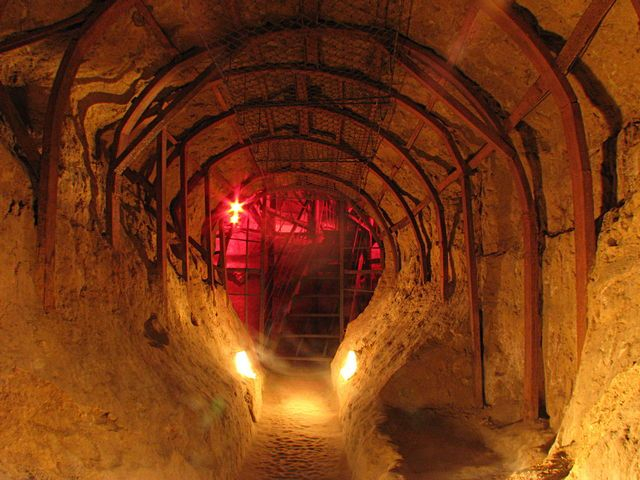
Photo: IGotoWorld.com -
The cave was named a Natural Wonder of Ukraine in 2008. Thousands of rowdy tourists and dozens of compulsive hucksters, congested cafes, and noisy transportation would not be found here. It's as though you're floating in space! There aren't many locations like this remaining on the planet. One of them is the Optimistic Cave.
Optimistic Cave is a gypsum cave near the Ukrainian hamlet of Korolivka in Ternopil Oblast's Chortkiv Raion. Within the area, around 230 km (140 mi) of passages have been mapped. As a result, behind Mammoth Cave, Sistema Sac Actun, Jewel Cave, and Sistema Ox Bel Ha, it is the longest cave in Eurasia and the fifth-longest cave in the world. It is also the world's longest gypsum cave.
The Optimistic Cave is unique in Europe, and possibly the entire world, in that it has not been spoiled by civilization. The world's longest gypsum labyrinth. Natural beauty. One of Ukraine's must-see destinations, it was just recently introduced to tourists. Trust us when we say that this will be the most unconventional kind of physical recreation and the most thrilling journey of your life.
The cave is covered with a 2 km2 layer of Neogene era gypsum that is less than 30 meters thick (98 feet). Most passages are no more than 3 metres (10 feet) broad and 1.5 metres (5 feet) height, though they can be up to 10 metres (33 feet) tall at intersections.
Huge rainbow crystals, one-of-a-kind helictites, stalactites, and stalagmites, all found in nature rather than in museums. Big galleries, tiny passageways, and gorgeous grottoes – you won't find all of this anywhere else than in Ukraine's Optimistic Cave.
Length: 230 km (140 mi)
Depth: 60 - 80 m
Location: Ternopilska oblast, Borshchiv region, Korolivka village, Lisova 14 street.
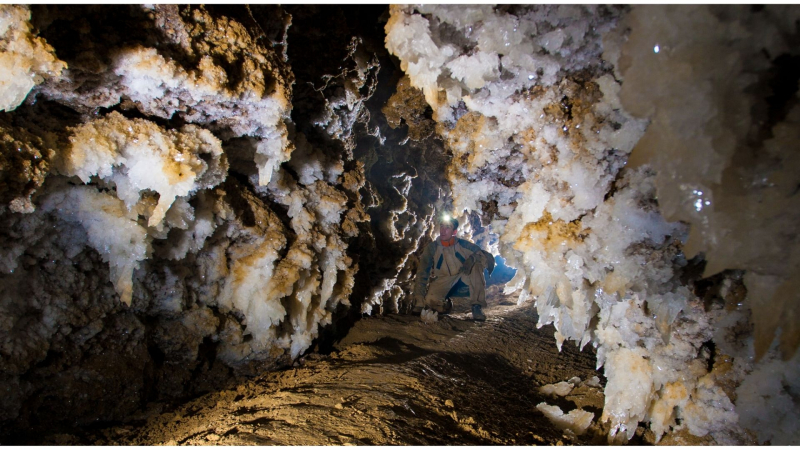
Photo: optymistychna.com 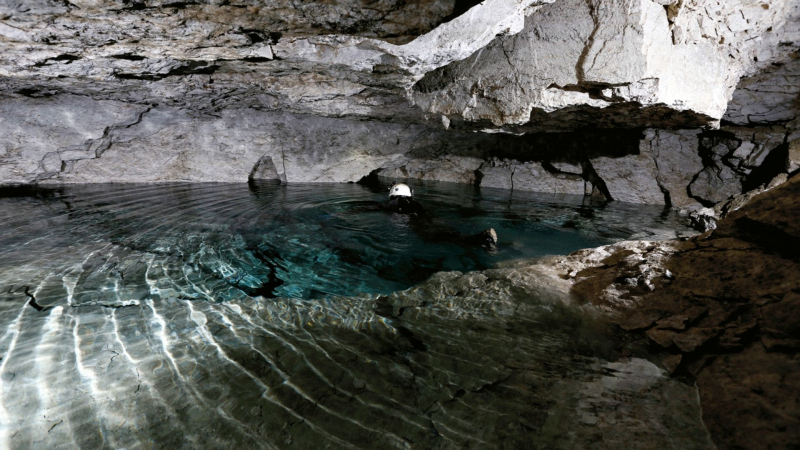
Photo: optymistychna.com -
Atlantida Cave is a cave in Ukraine known for its peculiar geology, odd formations, and pristine state. At the 1950s, a gypsum quarry was established in Zavallya. However, because to numerous holes in the rock, it did not work for long, rendering the enterprise unprofitable. Young speleologists from Kiev were drawn to the holes, which were discovered in 1969 by Valery Rogozhnikov, who also discovered Atlantida cave. "The Hall of Kiev Speleologists" is one of the cave's largest halls dedicated to them. Since 1975, the cave has been designated as a national natural geological monument.
In Ukraine, Atlantida Cave is the only cave with a horizontal three-level structure. This building is built on a lower level system of wide and high galleries generated by powerful localized subsurface flows. A labyrinth of downgoing passages known as "cellars" can be found on the same level in the gypsum stratum (as many of them are deadlock). The second level is around 9 meters above ground level and comprises of cavities that are narrowed to 1-1.5 meters in diameter. The higher level, which comprises two 5-meter-high tunnels, is just above the gypsum bed's top. At the crossings of galleries, there are also a number of halls up to 12 meters high. Dynamo, the Cave Conquerors' Hall, and the Kiev Speleologists' Hall are the largest. The morphology of Atlantida's galleries and halls is unaffected by the destruction process.
The cave's ceiling and walls are sculpted with gypsum speleothems such as stalactites, stalagmites, and straws of various colors, creating a magnificent sculptural shape. The cave is a one-of-a-kind mineralogical museum, with crystals ranging in size from tiny needles to 1.5 m long units. Rare bat species can be found at Atlantida cave.
Length: 2525 m
Depth: 18 m
Location: At the bank of the river Zbruch in Kamianets - Podilskyi Raion of Khmelnytskyi Oblast, close to Zavallya village.
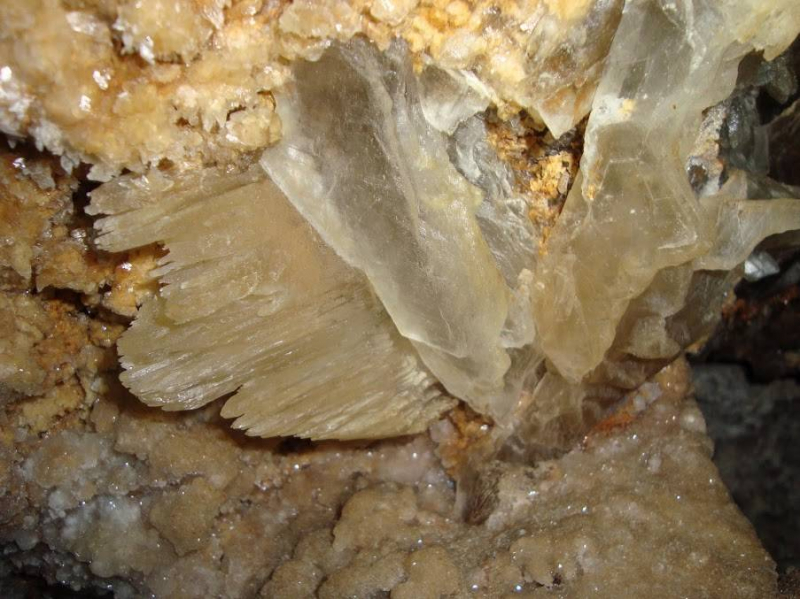
Photo: Wikipedia 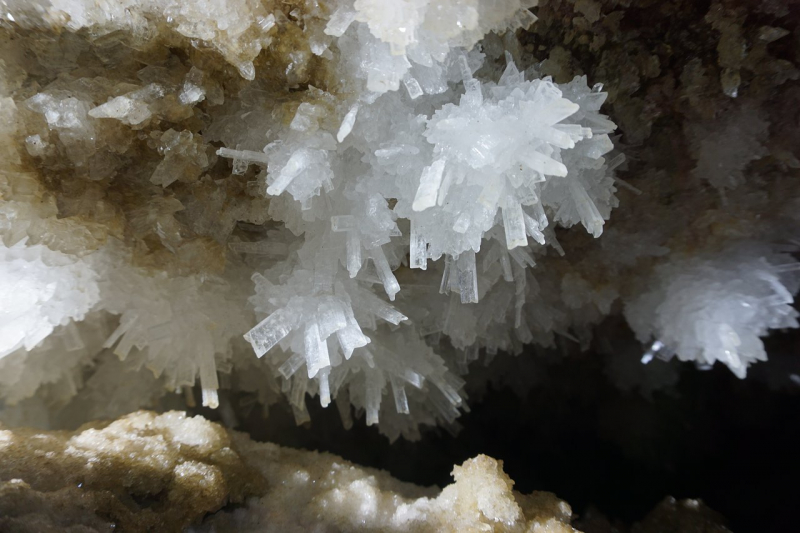
Photo: TripAdvisor -
"Mlynki" is a horizontal labyrinth gypsum cave that is one of Ukraine's most stunning gypsum caves. On June 25th, 1960, the first report about Mlynky cave came in the district newspaper "Nove zhyttya" (New Life). The cave's name was provided by the report's author, M. Bill, an Uhryn school teacher. Since ancient times, there has been talk of an underground hall. Locals were removing plaster (gypsum) for domestic requirements when they discovered a crevice through which they could enter the labyrinth of caves, but the fear of the unknown prevented them from doing so.
Crystals are colored by manganese and iron ions. This is a whole subterranean universe. The cave's quiet is broken only by the sound of falling water. The magnificent gypsum crystals that cover the unusual crystal cave create a phenomena that resembles a sky of majestic and brilliant stars.
Length: 45 km.
Depth: 30-60 meters (from the surface) and 300 meters (above sea level)
Location: Ternopil oblast (Chortkiv district, Zalissya village)
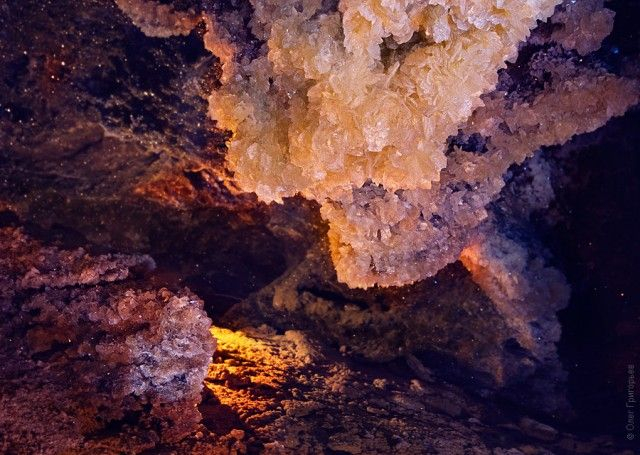
Photo: Pinterest 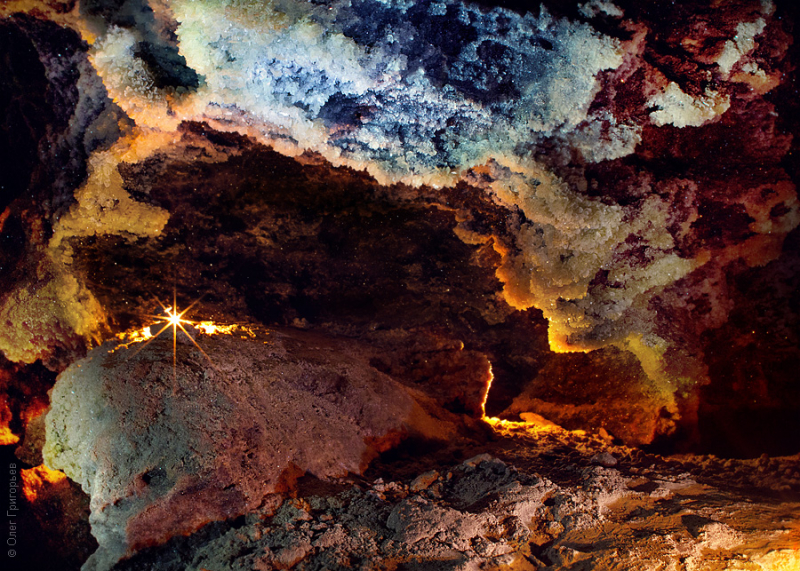
Photo: UkraineTrek.com -
Uhryn Cave is one of the most beautiful caves in Ukraine. It is located in the Ternopil region, 2 kilometers from the Mlynky cave entrance. It is a local geological natural monument that is part of the natural reserve fund area. Near the settlement of Uhryn, two kilometers west of the entrance to Mlynky cave, on the same right bank of the river Mlynochky, there is a massive funnel at the bottom of which the entrance to Uhryn cave looms black.
The slanted entrance hall called "Vestybul" extends 20 meters deep into the mountain. The cave's vicinity has been recognized since the first half of the twentieth century. The cave's history is detailed here. On the mountain, people mined gypsum, which was then burned and processed into flour for use in construction. For the landowner, Mr. Pototsky, various gypsum stone decorations were created, including ashtrays, boxes, and statues. Gypsum miners made a little hole in the earth but did not notice it. Mr. Otetsky, a local schoolteacher, became interested in this hole in the rock in 1934. He dug it up and discovered a big underground hall.
The cave has been developing since then. For the past two years, a crew of 15 workers has been clearing underground passageways. Later, the cave was held by the Podolsky regional tourist organization (PRTA), and it was cared for by a department of the Chortkiv PRTA.
The cave has been freely available to tourists since 1935. The entrance to the underground labyrinths has a gate with the text "The admittance to the underground labyrinths is paid." In the cave, there was a professional tour guide who gave the tour for a fee.
The cave of Uhryn became famous far beyond the district's borders. It drew visitors from Serbia, Romania, France, England, and other countries.
Length: 2120 m
Location: Vulytsya Mlynky, Zalissya, Ternopil Oblast, Ukraina ( 2km from Mlynki Cave)
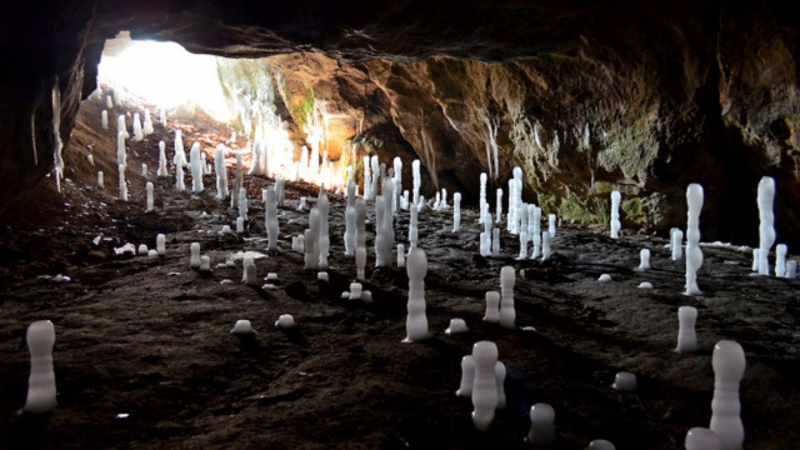
Photo: www.tourclub.com.ua 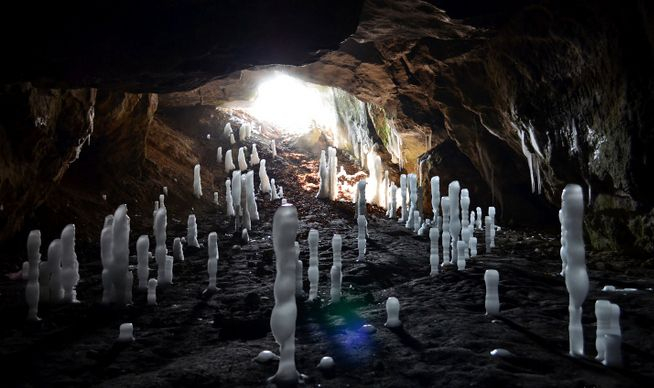
Photo: IGotoWorld








